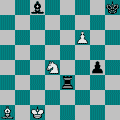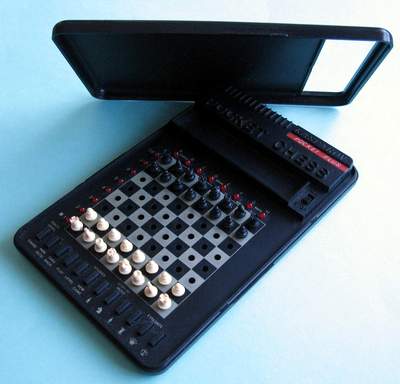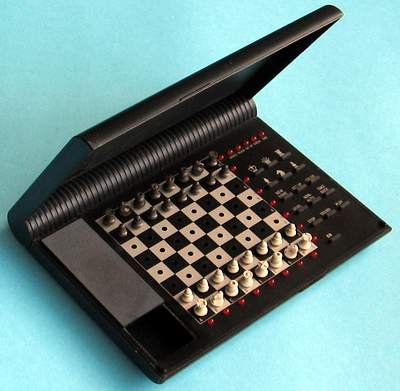THE SAME PROGRAM? (11 september 2007)
When discussing chess computers with people who have little or no knowledge about these machines one often comes across the same misconception: many people assume that a chess computer just plays its games using positions stored in its memory.
This may be true for the opening library, but when the computer has finished reading from this library, it goes on by 'imagining' (in its memory) the positions that will arise when certain moves are made. These 'imagined' positions are evaluated using several criteria, for instance:
- can the program win a piece?
- can the program create a so-called 'passed pawn'?
- do the pieces have maximum room for manoeuvering?
- are the pieces well-defended?
- can the rooks occupy any open files?
- are there any open lines towards the enemy king?

Of course, the computer will also 'imagine' what happens after the response by its opponent. In that case, the same kind of criteria will apply. Needless to say they have the opposite value: a piece won by its opponent, or an open file occupied by an enemy rook are considered unfavourable to the computer.
And the computer goes on evaluating the positions that can arise after the opponent's response, and so on ...
Another question I often hear is: what happens when a computer plays against itself, or against one that has exactly the same program?
As we saw above, the program tries to look ahead, so it can see the dangers that lie in waiting. Just like people cannot see around a corner, chess computers cannot see further than the positions they 'imagine'. This is sometimes referred to as the horizon effect.
The two programs take turns to see what advantages and dangers lie ahead. It's just a matter of luck when one computer is the first to find a trap that the other will not be able to escape from. And if they play lots of games, both programs will eventually win about the same number of games.
On Ismenio's Chess Computer Forum, a must for every chess computer enthusiast, it was recently suggested that two older pocket computers probably had the same strength. The first was Kasparov Pocket Plus , one very small computer indeed:
 Pocket Plus
Pocket Plus
The other one had a rather prosaic name: 1650L, a computer marketed by Tandy (Radio Shack). At the time, all Tandy's chess computers were made by Saitek. Since both computers were made by Saitek, one might imagine that both are powered by used the same program.
 1650L
1650L
As my name is Thomas (the unbeliever![]() ), I decided to test this by organizing a little match between the two
computers.
), I decided to test this by organizing a little match between the two
computers.
In the first three games both computers were allowed ten seconds per move. As was to be expected, the computers played rather tedious games that were hardly interesting to look at. For your information, the result was:
- 2 games won by Tandy 1650L
- 1 game won by Kasparov Pocket Plus
In all six games, both computers stopped playing from their opening library at exactly the same point, which might suggest they have the same program.
At 2 minutes per move, the result was the same as above:
- 2 games won by Tandy 1650L
- 1 game won by Kasparov Pocket Plus
In the following game, the Tandy computer mates its opponent in 39 moves. White's decisive mistake is on its 29th move. White might have drawn the game by playing 29. Bf6. If black takes the bishop, the exposed king would lose black the game. For instance: 29.... gxf6 30. gxf6 Ree8 31. Qg5+ Kh8 32. Qg7+ mate
White: Kasparov Pocket Plus
Black: Tandy 1650L
( 2 minutes / move)
The second game was won by Pocket Plus.
Black's 44th move might have allowed white to win with: 45. h4 Kf3 46. Kxb4 Kxg3 47. a4 Kxh4 48. a5 Kg3 49. a6 Kxf4 50. a7 h4 51. a8Q, etc. and white's queen will decide the game.
Black, however played diiferently. If ever there was a losing move, it's white's 47th! Lo and behold:
White: Tandy 1650L
Black: Kasparov Pocket Plus
( 2 minutes / move)
My conclusion is that the two computers probably have similar programs.
The Tandy computer, however, seems to play slightly better. Considering the fact that the level settings are somewhat different, I can imagine Pocket Plus could have a slower processor. I must, however, confess I don't know enough about hardware to check this.
On the other hand, it's also possible that if they had played a hundred games, both computers might have won about equal numbers. But I found six games more than enough. Wasting hundreds of hours with two rather unintelligent computers is not exactly my cup of tea.